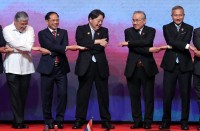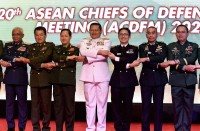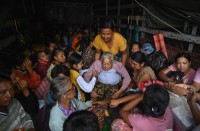(Eagle News) — What are the implications of the Rice Tariffication Act which was recently signed into law by President Rodrigo Duterte? Will it address the so-called rice crisis in the country?
In this epsiode of ASEAN in Focus Weekend Edition, former Director General of the International Crops Research Institute for the Semi-Arid Tropics (ICRISAT) and former agriculture secretary, Dr. William Dar, analyzes the issue.
Dar explains how the lifting of the quantitative restrictions (QR) on rice imports will affect the country. He also discusses the issue of the rice fund or the rice competitiveness enhancement fund (RCEF) which is the P10 billion annual fund allocated for the improvement of the situation of Philippine rice farmers for the next six years.
Dar also discusses in this interview how the rice production in the country fares as compared with other ASEAN countries, and what will be the new role of the National Food Authority (NFA) under the new law.
He also gives his suggestion on how to address the issues surrounding Philippine agriculture, including food security in the country, during the program.
He is interviewed by the program’s anchor, Dr. Carlos Tabunda Jr., head of the New Era University ASEAN Studies Center.
Dar was the ICRISAT director general from 1999 to 2014. ICRISAT is an international organization which conducts agricultural research for rural development, headquartered in India with several regional centers (Bamako (Mali), Nairobi (Kenya)) and research stations (Niamey (Niger), Kano (Nigeria), Lilongwe (Malawi), Addis Ababa (Ethiopia), Bulawayo (Zimbabwe)). The organization was founded in 1972 by a consortium of organizations convened by the Ford and the Rockefeller foundation, and its charter was signed by the Food and Agriculture Organization (FAO) and the United Nations Development Program (UNDP).
DAR was also the first director of the Philippine Bureau of Agricultural Research (BAR) in 1988, when the Philippines began to invest in the creation of a national system of advanced agricultural research institutes like the Philippine Rice Research Institute. PhilRice.
He was also the director of the Philippine Council for Agricultural Research and Rural Development (PCARRD) and served on the governing boards of international research bodies such as the International Rice Research Institute (IRRI) and the CIMMYT (Centro Internacional de Mejoramiento de Maíz y Trigoor) or the International Maize and Wheat Improvement Center), aside from ICRISAT.
Dar served briefly as the acting secretary of Agriculture and became Presidential Adviser on Rural Development during the Presidency of Joseph Estrada.
The international agricultural sector expert has published several books. Among the books he had written was “Feeding the Forgotten Poor”, which was launched in 2012 when no less than the former president of India, His Excellency Dr. APJ Abdul Kalam was present. This was during the 2nd Global Agri-business Incubation Conference in New Delhi.
ASEAN in Focus weekend edition interviews international experts on various fields affecting the ASEAN region. It airs every Saturday 2 p.m. to 3 p.m., at NET 25, the television portal of Eagle Broadcasting Corporation.








